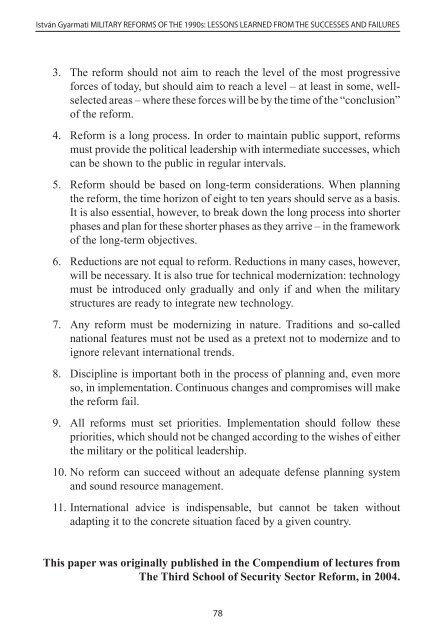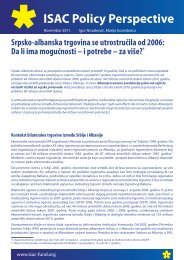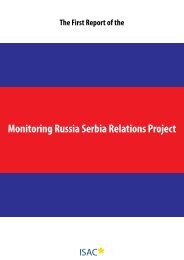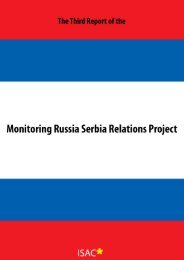the process of security sector reform - ISAC Fund
the process of security sector reform - ISAC Fund
the process of security sector reform - ISAC Fund
You also want an ePaper? Increase the reach of your titles
YUMPU automatically turns print PDFs into web optimized ePapers that Google loves.
István Gyarmati MILITARY REFORMS OF THE 1990s: LESSONS LEARNED FROM THE SUCCESSES AND FAILURES<br />
dr Biljana Vankovska PRAVNI ASPEKTI REFORME BEZBEDNOSNOG SEKTORA: MOĆ I NEMOĆ PRAVA<br />
3. The <strong>reform</strong> should not aim to reach <strong>the</strong> level <strong>of</strong> <strong>the</strong> most progressive<br />
forces <strong>of</strong> today, but should aim to reach a level – at least in some, wellselected<br />
areas – where <strong>the</strong>se forces will be by <strong>the</strong> time <strong>of</strong> <strong>the</strong> “conclusion”<br />
<strong>of</strong> <strong>the</strong> <strong>reform</strong>.<br />
4. Reform is a long <strong>process</strong>. In order to maintain public support, <strong>reform</strong>s<br />
must provide <strong>the</strong> political leadership with intermediate successes, which<br />
can be shown to <strong>the</strong> public in regular intervals.<br />
5. Reform should be based on long-term considerations. When planning<br />
<strong>the</strong> <strong>reform</strong>, <strong>the</strong> time horizon <strong>of</strong> eight to ten years should serve as a basis.<br />
It is also essential, however, to break down <strong>the</strong> long <strong>process</strong> into shorter<br />
phases and plan for <strong>the</strong>se shorter phases as <strong>the</strong>y arrive – in <strong>the</strong> framework<br />
<strong>of</strong> <strong>the</strong> long-term objectives.<br />
6. Reductions are not equal to <strong>reform</strong>. Reductions in many cases, however,<br />
will be necessary. It is also true for technical modernization: technology<br />
must be introduced only gradually and only if and when <strong>the</strong> military<br />
structures are ready to integrate new technology.<br />
7. Any <strong>reform</strong> must be modernizing in nature. Traditions and so-called<br />
national features must not be used as a pretext not to modernize and to<br />
ignore relevant international trends.<br />
8. Discipline is important both in <strong>the</strong> <strong>process</strong> <strong>of</strong> planning and, even more<br />
so, in implementation. Continuous changes and compromises will make<br />
<strong>the</strong> <strong>reform</strong> fail.<br />
9. All <strong>reform</strong>s must set priorities. Implementation should follow <strong>the</strong>se<br />
priorities, which should not be changed according to <strong>the</strong> wishes <strong>of</strong> ei<strong>the</strong>r<br />
<strong>the</strong> military or <strong>the</strong> political leadership.<br />
10. No <strong>reform</strong> can succeed without an adequate defense planning system<br />
and sound resource management.<br />
11. International advice is indispensable, but cannot be taken without<br />
adapting it to <strong>the</strong> concrete situation faced by a given country.<br />
This paper was originally published in <strong>the</strong> Compendium <strong>of</strong> lectures from<br />
The Third School <strong>of</strong> Security Sector Reform, in 2004.<br />
dr Biljana Vankovska<br />
Redovni pr<strong>of</strong>esor na Filoz<strong>of</strong>skom fakultetu u Skoplju<br />
PRAVNI ASPEKTI REFORME BEZBEDNOSNOG<br />
SEKTORA: MOĆ I NEMOĆ PRAVA<br />
VLADAVINA PRAVA,<br />
DEMOKRATIJA I DEMOKRATSKA KONTROLA<br />
BEZBEDNOSNOG SEKTORA<br />
Principi vladavine prava i demokratske kontrole bezbednosnog sektora,<br />
podjednako imanentni za demokratsku vladavinu, bili su lajtmotivi <strong>reform</strong>e u<br />
post-komunističkim društvima još od samog početka tranzicije. Iznenađujuće,<br />
zbog različitih razloga, oni su se veoma retko mogli naći u svom prirodnom<br />
jedinstvu. Na vladavinu prava se uobičajeno gleda kao na condition sine qua<br />
non u procesu političke demokratizacije i transformacije. Demokratska kontrola<br />
bezbednosnog sektora, međutim, se ređe stavlja u kontekst političkog procesa, a<br />
mnogo više i češće se percipira kao jedan od najvažnijih kriterijuma za integraciju<br />
u evroatlantskim strukturama. Zbog toga, elaboracija esencijalne veze između<br />
ova dva principa mora se načiniti veoma vidljivom i eksplicitnom.<br />
Polazna tačka ovog diskursa su obično iskustva i tradicije razvijenih zapadnih<br />
demokratija, koje je stečeno i razvijeno u toku dugovekovnog prakticiranja demokratije.<br />
S druge strane, sjajni rezultati u simultanoj implementaciji oba principa<br />
ne oslobađaju i razvijene demokratije obaveze da permanentno brinu o njihovom<br />
ponovnom preispitivanju u kontekstu novonastalih istorijskih konstelacija i<br />
prioriteta. Izgradnja Zapadne bezbednosne zajednice (<strong>security</strong> community), i<br />
nastupajući trend internacionalizacije civilno-vojnih odnosa, traže nove demokratske<br />
odgovore, i to više ne samo na nacionalnom nego i međunarodnom nivou.<br />
Tačnije, novi se izazovi javljaju u obliku demokratske (dakle, horizontalne i vertikalne)<br />
kontrole nadnacionalnih oružanih snaga (NATO, EU) i primenljivosti<br />
tradicionalnih mehanizama te kontrole. Međutim, ono što danas dominira je stanovište<br />
da je Zapad odavno postavio temelje demokratske kontrole i da tu više nema<br />
većih problema, osim tekućih.<br />
78 79

















